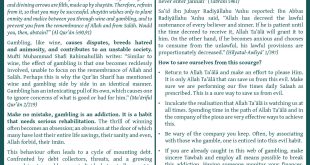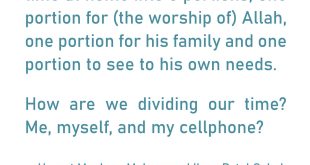The world has seen a surge in interfaith promotion. Muslims have not been spared either. Highly publicised events featuring prominent scholars who participate alongside jewish, christian, hindu, Baháʼí, etc. clerics are becoming commonplace.
This sparks diverse viewpoints, with some saying it is blurring religious lines and compromising Islamic principles and Muslim identity. While others say that it is necessary to maintain peaceful coexistence and it doesn’t pose a threat to Islām and the Muslims. In fact, some proponents even quote Islamic sources to support their position.
Let us explore the concept, its perceived benefits and challenges, and analyse the correct Islamic perspective regarding these interfaith engagements.
WHAT IS “INTERFAITH”?
Literally, interfaith refers to the interaction between persons belonging to different religions, regardless of whether this interaction has a religious connotation or not.
However, in recent times, the words “interfaith” and “multifaith” are products of a strategic plot with far-reaching consequences. The dilution of Imān is woven into its objectives.
Interfaith dialogue is a gathering where experts of different religions sit together and discuss religion, with the object of increasing understanding of their respective religious cultures and appreciating each other’s spiritual values. To achieve this, interfaith societies worldwide have developed principles that govern these sittings.
A few Interfaith Dialogue Principles:
- Learn and grow, not change the faith of others.
- Participants should be open to critique and criticize their own religion.
- Open-mindedness: Embracing diverse perspectives.
- Active Listening: Engaging with empathy.
- Non-judgmental attitude: avoiding criticism.
- Theological Tolerance: Respecting differences.
- Mutual Respect: Valuing each other’s beliefs and traditions.
These are some of the principles that are called upon when engaging in an interfaith dialogue. Let us examine a few of them:
Principle 1: When engaging in interfaith dialogue, the purpose should be to learn and grow, not to change the faith of others
In other words, for interfaith dialogue to be productive, the participants should be willing to learn from one another and alter their views. The aim should not be to change others’ beliefs.
This contradicts basic Islamic principles. From the lives of Rasulullāh Sallallāhu ‘Alayhi Wa Sallam and the Sahābah Radiyallāhu ‘Anhum, we learn that any interaction with the disbelievers was with the sole desire to bring them closer to Islām and thereby save them from the fire of Jahannum. If there was a need to discuss religion with the non-believers, it was founded on the premise that Islam is the only true religion, which must be shared with one and all. There was no question of learning from others to adapt the practices of Islam.
It is an integral part of our Imān to believe that Islām is true and complete in every sense. It has no faults, and it is not open to revision. Rasulullāh Sallallāhu ‘Alayhi Wa Sallam did not even permit the companions to refer to or draw lessons from earlier scriptures.
Once Sayyiduna ‘Umar Radiyallāhu ‘Anhu brought a scroll to Rasulullāh Sallallāhu ‘Alayhi Wa Sallam, which he acquired from the people of the book, i.e., the Jews, and He said: ‘O Rasulullāh! I have a noble scripture from the people of the book.’ Rasulullāh (Sallallāhu ‘Alayhi Wa Sallam) became angry and said: ‘Are you being reckless, O son of Khattāb? By the oath of Allah! I have brought (Islām) to you in a bright and clear state. It shouldn’t be that you deny the truth they relate or believe the falsehood they tell. By the oath of Allah! If (Nabi) Moosa (‘Alayhis Salām) were alive today, he would have no other option but to follow me.’ (Ahmad,15156)
Muslims participating in interfaith dialogues often justify their involvement as an opportunity for Da’wah. However, these gatherings essentially contradict the principle of Da’wah, which requires upholding the fact that Islām is the only truth and all other beliefs are false. Hence, Da’wah is the very antithesis and opposite of the interfaith agenda. How could we then spread Islām through a scheme designed to dilute it?
Principle 2: The participants should be open to criticizing and criticizing their own religion
In fact, some interfaith societies say: “A lack of such self-criticism implies that one’s own tradition already has all the correct answers and that one has nothing to learn. Such an attitude makes dialogue not only unnecessary but almost impossible.”
As Muslims, our belief (‘Aqeedah) is that Islam is divinely ordained, complete, and perfect. Allāh Ta’ālā has revealed it, and we have no right to criticism or amendment. Given this conviction, participating in interfaith dialogue offers no benefit, as our beliefs are not subject to revision or debate.
Allāh Ta’ālā says in the Qur’ān Karīm: “Today, I have perfected your religion for you, have completed My favour upon you, and chose Islām as your Dīn (religion and a way of life).” (Al-Qur’ān 5/3)
Principle 3: Participants should communicate their own views sensitively, refraining from criticism, judgment, or language that may be hurtful or alienating to followers of other religions.
In simple terms, a Muslim explaining Islām should do it in such a way that no one feels offended. Many a time, this leads to a compromised account of Dīn. For example, interfaith memos advise that a person should add the words “for me” to his statements. So, a Muslim should say, for example, “Muhammad Sallallāhu ‘Alayhi Wa Sallam is the last Nabi for me!” He should not say: “Muhammad Sallallāhu, ‘Alayhi Wa Sallam is the last Nabi,” as this may offend someone who doesn’t believe in it.
Once again, this is against the clear teachings of Islam. We believe that Nabi Sallallāhu ‘Alayhi Wa Sallam is the last Nabi for all of mankind.
When the Ambiya ‘Alayhimus Salām presented their Da’wah, they did so without fear or favour. Allāh Ta’ālā recalls the Da’wat of many Ambiya ‘Alayhimus Salām in the Qur’ān Karīm, e.g., A number of Ambiya ‘Alayhimus Salām said to their people: “O my nation, worship Allāh; there is no deity for you besides Allāh.” Similarly, Nabi Sallallāhu ‘Alayhi Wa Sallam presented his Da’wah clearly. This was despite the opposition Nabi Sallallāhu ‘Alayhi Wa Sallam and his Sahābah Radiyallāhu ‘Anhum faced as a consequence.
INTERFAITH PRAYERS ARE FOUNDED ON THE SAME PRINCIPLES
The organizers of interfaith prayers usually have similar principles in mind. Participants are not allowed to invite others to their religion and should be conscious of not offending others while offering their prayers. Muslims in interfaith prayers, perhaps unwittingly, use universal vocabulary so as not to trouble the conscience of others. For example, they commonly refer to Allāh Ta’ālā as “God Almighty”.
MUSLIMS SHOULD ABSTAIN FROM EVEN USING THE WORD “INTERFAITH.”
As Muslims, we are sensitive to our beliefs and remain unwavering in our devotion to our Dīn. We will never tolerate any compromise in this regard. We understand that “interfaith” is related to a movement that is at variance with our Dīn, so it is the demand of our love for Dīn and our connection with Nabi Sallallāhu ‘Alayhi Wa Sallam that we distance ourselves from it. We should refrain from using the very word “interfaith”, even when referring to a legitimate cause that involves non-Muslims, like a security initiative, etc.
How could we consciously participate in an initiative or even unconsciously promote an idea that seeks to water down our Deen, compromising its purity and integrity?
May Allāh Ta’ālā protect our Imān and make us from amongst those who never compromise their Dīn. Āmīn
3 Jumādal Ula 1446
04 November 2024
A0046/1
 Wifāq ul Ulāma (SA) ASSOCIATION OF SOUTH AFRICAN 'ULAMA
Wifāq ul Ulāma (SA) ASSOCIATION OF SOUTH AFRICAN 'ULAMA


